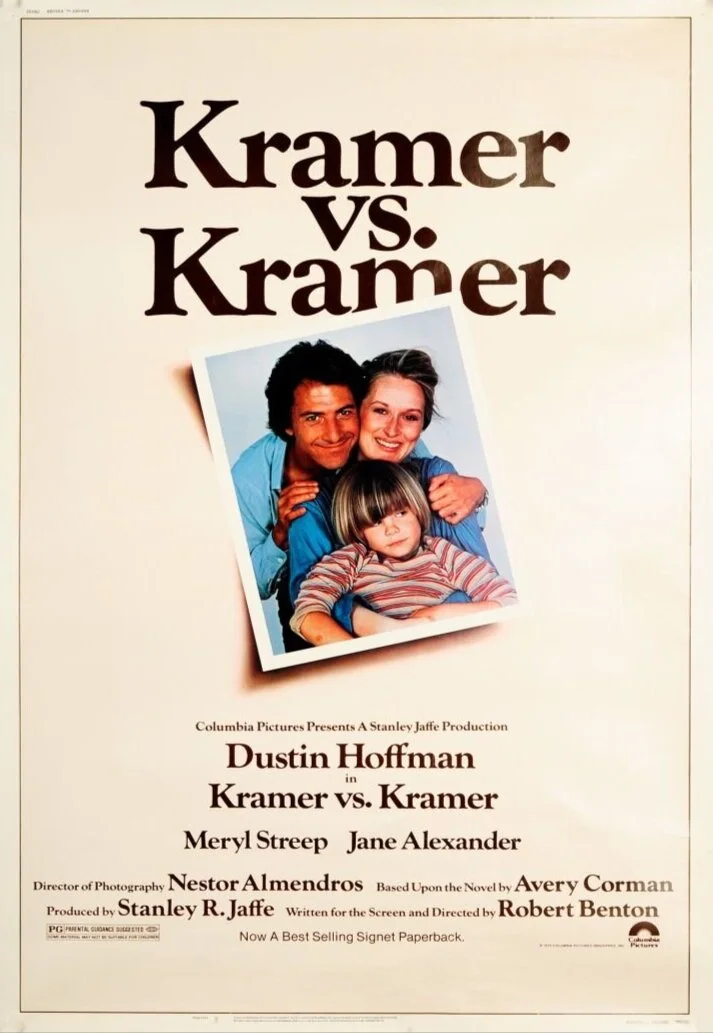Kramer vs. Kramer (1979)
Written & Directed by Robert Benton
There’s a series of similar scenes in Kramer vs. Kramer, spaced relatively equally apart, that really help show why this movie is a great piece of cinema (my choice of not saying a “Best Picture” is deliberate). The scene involves Ted Kramer, played by Dustin Hoffman, making breakfast for his young son Billy, played by Justin Henry.
The first scene is the morning after Joanna Kramer, played by Meryl Streep, leaves Ted, and Ted must suddenly do all the things she used to (and does them spectacularly awful), including attempting to make breakfast.
Dustin Hoffman
The next takes place a few months later, as father and son fall into a routine, a glorious ballet of normalcy, each wordlessly helping the other to arrive at the breakfast table together flawlessly.
Finally, the breakfast from the first scene is repeated nearly exactly, except Ted is able to perfectly cook the breakfast. However, no words are spoken, as both father and son wrestle with the emotions of handing custody of Billy over to Joanna in just a few short hours.
I wanted to mention these three scenes because I believe they highlight the power of character in this film. I mentioned earlier that I deliberately didn’t use the term “Best Picture”, and that’s true: I don’t think this film is a best picture, but I do think it’s a great movie, because this film is a great examination of character.
The primary focus is on Hoffman, thrown suddenly into the single-father life, while juggling a high-demand job. It’s a story we don’t see very often, and the film smartly doesn’t begin with him, focusing on Streep and making her the sympathetic character, only to have her 180 and say she’s actually leaving Billy behind and walking out. She then disappears for the bulk of the film, leaving Hoffman behind to pick up the pieces, and it’s a very engaging way to see him evolve as a person and a father.
Hoffman portrays the journey expertly, from wildly inept and running along the emotional gamut (the first breakfast scene), to stable (the second breakfast scene), to cracking again as, in his new maturity, he still can fall victim to life-altering events (the final breakfast scene). Hoffman immediately engages us in the film, and we run those emotions with him, cringing when he fails and smiling when he succeeds.
Meryl Streep
It’s easy to think of Streep as the victim, and on paper she certainly comes off that way. Granted, as much as she tries to win over the judge (and us) with her reasons on suddenly coming back and demanding custody of Billy, Streep never fully succeeds (at least, with the audience). Still, she’s able to imbue Joanna with at least a dash of likability, and while I think the audience never leaves Hoffman’s corner, Streep’s performance offers a temptation.
Finally, Justin Henry as Billy gives a great performance, one of those that is both intuitive and also clearly directed. He was only 8 at the time of this film, so a slightly stagey performance can’t really be faulted against him. He remains the youngest actor ever nominated for an Academy Award, and his performance, particularly in the second half of the film, is truly heart-wrenching.
I’ve never really set an official rubric when grading these films, instead going by a gut feeling. That feeling continues here, as, like I mentioned, I don’t think this film is a best picture, but I do think it’s a great one. Many of its accolades are well deserved, but besides its fantastic character study, the film doesn’t really push the form anywhere, which is something I’m starting to notice across the board with these films. Still, it’s an excellent film, and it deserves a good grade.
FINAL GRADE: B+




